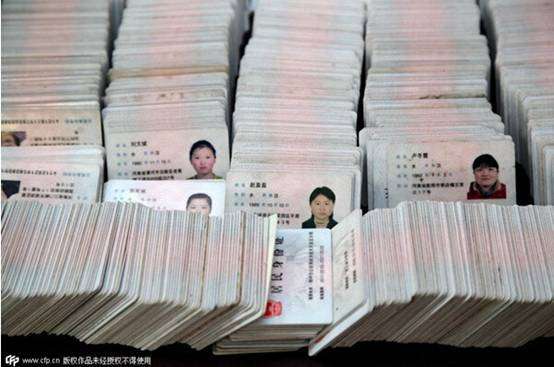eID“公民网络电子身份标识”签发
独立于公民身份信息系统之外的“公安部公民网络身份识别系统”,已通过国家密码管理局的安全审查,开始向公民签发eID(公民网络电子身份标识)。

Some of the 10,000 unclaimed ID cards on display on a table of a lost-and-found company in Zhenzhou, Central China's Henan province, on Monday. [Photo/CFP]
请看相关报道:
China's Ministry of Public Security has issued its first batch of e-IDs backed by an independent, Internet-based identity recognition system for citizens, as the country moves to fight personal information leaks.
公安部已经签发了第一批独立的、基于公民网络身份识别系统的公民网络电子身份标识,以防公民个人信息泄露。
“公民网络电子身份标识”用英文e-ID(electronic identity)表示,由公安部第三研究所建设和开发,并由“公安部公民网络身份识别系统”签发给公民,用于在网络远程证实个人真实身份。
我国在2012年已开始签发公民电子护照(electronic passport),去年,广东还试点电子版港澳通行证(e-permit),这一类电子证件都是采用高安全性集成电路芯片(integrated circuit chip),记录持卡人的个人信息、指纹。
目前,我国缺少网络身份识别和服务的公共基础设施(lack public infrastructure for Internet-based ID recognition and services),绝大部分网络应用只能以姓名、身份证号等身份信息进行网上身份认证(online identity certification),这是导致个人信息泄露(personal information leaks)的深层原因。
电子身份标识的加密算法(encryption)在理论上是不可破解的,即使被读出,也只是没有意义的字符串。未来公民可以使用e-ID进行在线注册或交易(online registrations and transactions),而不需提供个人信息(personal information)。







